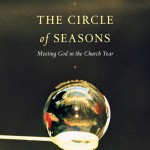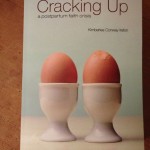Abba Lot went to see Abba Joseph and said to him, “Abba, as far as I can I say my little office, I fast a little, I pray and meditate, I live in peace, and as far as I can, I purify my thoughts. What else can I do?”
Then the old man stood up and stretched his hands towards heaven. His fingers became like ten lamps of fire and he said to him, “If you will, you can become all flame.”
—translated by Benedicta Ward, SLG,
The Sayings of the Desert Fathers

Psalm 132
Lord, remember David
and all his trouble;
how he sware unto the Lord
and vowed a vow unto the Almighty God of Jacob:
“I will not suffer mine eyes to sleep,
nor my eyelids to slumber,
neither the temples of my head to take any rest,
until I find out a place for the temple of the Lord,
an habitation for the mighty God of Jacob.”
Lo, we heard of the same at Ephrata
and found it in the wood.
We will go to his tabernacle
and fall low on our knees before his footstool.
Arise, O Lord, into thy resting-place,
thou, and the ark of thy strength.
Let thy priests be clothed with righteousness
and let thy saints sing with joyfulness.
For thy servant David’s sake
turn not away the presence of thine Anointed.
The Lord hath made a faithful oath unto David,
and he shall not shrink from it:
“Of the fruit of thy body shall I set upon thy seat.
If thy children will keep my covenant
and my testimonies that I shall learn them,
their children also shall sit upon thy throne forevermore.”
For the Lord hath chosen Sion to be an habitation for himself;
he hath longed for her.
“This shall be my rest for ever;
here will I dwell, for I have a delight therein.
“I will bless her victuals with increase
and will satisfy her poor with bread.
I will deck her priests with health
and her saints shall rejoice and sing.
“There shall I make the horn of David to flourish;
I have ordained a lantern for mine Anointed.
As for his enemies, I shall clothe them with shame,
but upon himself shall his crown flourish.”
~
This is by far the longest of the Psalms of Ascent. It is also the only one to recite the history of Israel at such length. As the pilgrims walked toward Jerusalem, they remembered David, who made the city his capital and had the ark brought there from its exile among the Gentiles; David, who longed to build a temple for the Lord, a place worthy of His Name and of the ark of His Presence; David, to whom God said no, it is not you who shall build me a house.
Even so, God did bless Jerusalem, David’s city, in a special way. God blessed the city with His Presence.
If we were to read the psalm allegorically (which of course we’re going to do), we would quickly make the leap from the historical-literal city of Jerusalem to the allegorical cities of the Church and of the human heart, where God also deigns to dwell and which God also longs to bless with His Presence.
As I reflected on the words of this psalm, the phrase that kept shimmering for me was from the penultimate verse: “I have ordained a lantern for mine Anointed.” For the psalmist “mine Anointed” was the king, but from this side of history, the Anointed (Messiah) is Jesus who was and is the Light of the World: “In him was life, and the life was the light of men.”
But Jesus who brightens and enlightens the world says that those who follow Him are also lights: “You are the light of the world.” Friends, we are the lanterns God has ordained for His Anointed!
We are the lanterns through which Christ shines in the darkness, and we are also Zion, the city set on the hill, ablaze with all that light. God, the psalm tells us, “hath longed” for Zion. He longs for us. We are the place where God dwells and in which He takes delight.
But it’s not a given that He will dwell with us. There’s a big fat “if” in this psalm:
If thy children will keep my covenant
and my testimonies that I shall learn them…
God’s presence is always a gift, and it’s a gift He does not have to give. He delights to give it, He longs to give Himself to us, to dwell with us, but He will never force Himself on us. He will withdraw Himself rather than force us to receive a gift we don’t want. He will leave Jerusalem to its own devices if that’s what its people insist upon. This terrifies me. I almost wish He wouldn’t. I look around and I see proof of His incredible restraint, His unstinting insistence on human freedom. We don’t deserve it. But then God’s never been about giving us what we deserve, has He? Instead, He wants to give us what is best—He wants to give us Himself, ultimate Reality, the burning Love at the heart of the cosmos.
This is what God longs for: Zion, the city on a hill, ablaze with free people who receive His free gift of Presence, all of us ordained lanterns of God’s Anointed, our Lord Jesus.
That is what God longs for. What do we long for?
Do we long to receive God’s gift? Do we say, day after day, “come, Lord Jesus”? Do we receive Him when He comes? Do we believe He is right here, right now? Not just head-level-assent believe, but heart-level-abandon believe. For that’s how we receive Him: by abandoning ourselves to Him. Thy will be done. Into Thy hands.
In that most famous of all Bible verses (“…whosoever believeth in him…”), believe in would be more accurately translated trust into or even entrust into. There’s movement in the Greek preposition; it’s not static, it’s active. Belief isn’t passive. Like waiting, it’s something we do. It’s an active act of surrender, an active act of turning Godward with open arms, ready to receive whatever God would give. We have to co-operate with Him; He won’t force Himself on us, and He won’t do it for us. We must receive. We must trust. We must turn and re-turn. We must open our hearts, the way we would open a window to catch the breeze or let the sunlight in. The breeze is already there, the light is already there—”Behold, I stand at the door and knock”—all we do is open to it. And the waiting Wind, the kindly Light will come.
God would make His home in us, friends. Will we let Him?
He would light a fire in the hearth of our hearts; He would breathe those cold ashes into flame. Will we let Him? He would trim our wicks and pour the holy oil of gladness into our lamps. Will we let Him?
He would bless our victuals with increase and satisfy our poor with bread. He would deck our priests with righteousness and our saints with joy. He would make us saints. Will we let Him?
He would crown us with Himself. Will we bow our knees and bend our necks to receive that crown? Will we open our hearts to His light and His love? Will we let Him burn within us, burn away the fear, the pettiness, the ingratitude, the self-pity, the uncharitable thoughts, the duplicity, all the million and one ways we turn our eyes and lives away from Him? Will we trust ourselves to the burning holy fire of His love? Will we entrust ourselves into Him?
Will we become all flame?

